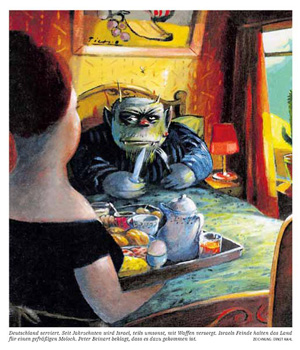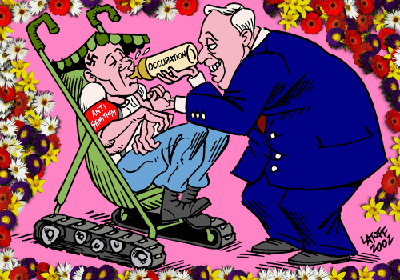Hostile Europe
Robin Shepherd contends that the continent is a morally spent force overly concerned with bashing Israel while timorously appeasing radical Islam
Tibor Krausz
The Jerusalem Report, March 29, 2010
When a BBC World Service news bulletin on a wall-mounted TV screen turned to Israel’s response to a terror attack, a genial British theater producer I was chatting with in a London pub scowled and mimicked spitting. “Bloody bastards!” he huffed. “Look what they’re doing to those Palestinians."
Not long afterward, this time in Budapest, I found myself seated opposite a gynecologist at a dinner party. During desserts the Hungarian doctor treated me to his views about the perfidy of the Mossad in engineering the September 11 attacks. Another time, a German acquaintance — a historian of the Holocaust, no less — lamented Israel’s refusal to “work honestly for peace” and dismissed my views of Palestinian intransigence with a memorable “Ah, but the Arabs are in the doghouse!"

None of these European intellectuals seemed particularly anti-Semitic. Yet their reflexive hostility toward Israel was informed by a time-honored set of anti-Jewish calumnies, conspiracy theories, and double standards, which they unwittingly articulated with the certitude of bigots.
I’m a proud European, enamored of the continent’s unparalleled intellectual, artistic and cultural heritage. So how sad it is to see that the mere mention of Israel triggers a Pavlovian reflex among its chattering classes that sets them off on half-baked diatribes. Otherwise cultured and educated Europeans who might be hard-pressed to locate Israel on a map of the Middle East feel entitled to excoriate the Jewish state for its alleged war crimes, “ethnic cleansing,” and inherently racist tendencies. A French cartoonist, who revels in unrelenting anti-Israel innuendo in his syndicated drawings, even chided me for daring to suggest that to appreciate the complexities of the Israeli-Palestinian conflict, he might benefit from spending some time in the region.
Then again, probably even observing the intricacies of Middle Eastern politics up close would do little to allay his contempt for Israel. The rabid anti-Zionism of many European intellectuals seems impervious to facts — insofar as they’re familiar with them. In newspaper columns, on political talk shows, and in private conversations, spurious charges against the Jewish state are parroted ad nauseam until they acquire the gravitas of unquestionable truth.
To cite a few: Gaza is an “occupied” territory; even though Israel evacuated the area in 2005, uprooting all its settlements. The “root cause” of Palestinian terror is Israeli “occupation”; even though Palestinian militants’ professed goal since Israel’s creation in 1948 has been to eradicate the Jewish state entirely. Israel is an “apartheid” country; even though its Arab citizens enjoy greater rights than the citizens of most Arab countries.
But there you have it. Intellectual discourse in Europe about the Israeli-Palestinian conflict is influenced by a litany of exaggerated and mistaken claims so deeply entrenched that no counter-reasoning can shake them.
Yet it’s worth trying. That’s why a new book, by a professedly neutral observer, rising to Israel’s defense against the swelling tide of anti-Zionism across Europe is so welcome.
* * *
“Commentary on Israel from writers, Nobel Prize winners [such as Portuguese writer Jose Saramago], columnists and the like,” writes Robin Shepherd in “A State Beyond the Pale: Europe’s Problem with Israel,” “provides us with a window into the European soul.”
And it isn’t pretty.

“From a large portion of contemporary Europe’s opinion formers,” explains the British author, who is the director of international affairs at a UK-based think-tank, “we are now experiencing a tidal wave of hysteria, deception and distortion against the Jewish state which has not only brought resurgent anti-Semitism in its wake but also risks becoming a stain on the continent’s entire political culture.”
Shepherd makes a cogent case, which isn’t hard to begin with, that Israel has become a leper among nations in the eyes of Western European intellectuals who betray an almost pathological obsession with the country’s flaws, real or imagined. An Anglican professing to have no pro-Zionist biases, Shepherd advocates not unthinking support for Israel’s actions but an honest appraisal of them. European opinion formers, argues the author (who limits his survey to the continent’s western part), refuse to see Israel for what it is: a beleaguered progressive liberal democracy in a vast landscape of backward autocracies and theocracies. Instead, they blithely endorse the Arab narrative, which demonizes the Jewish state as an insufferable anachronism — a racist colonizing implant in the midst of a largely homogeneous civilization.
Israel is so routinely vilified, Shepherd points out, that European commentators habitually lump the Jewish state, explicitly or implicitly, into the same rarefied category of evil regimes as apartheid-era South Africa and Nazi Germany. “The essence of the problem for Israel is that moderate and extreme narratives have, to a great extent, morphed into each other,” Shepherd writes. “While it should be possible to see a world of difference between attempts to characterize Israel as a modern-day equivalent of Nazi Germany and constructive criticism of settlement activity on the West Bank, the distinction has become increasingly blurred.”
Because the charges of Israel bashers are based on tenuous grounds, he notes, their modus operandi is to ignore facts and their contexts while inflating the Jewish state’s crimes and misdemeanors out of all proportion until they seem to rival those of the Nazis and white supremacists. Tasteless hyperboles abound: Israelis’ treatment of Palestinians is akin to the Nazis’ treatment of Jews. Gaza is a concentration camp. Settlement activity is a barefaced attempt at latter-day colonialism. The security barrier is a new Berlin Wall.
In Europe’s intellectually shallow, relativistic world of diminished moral certainties, anti-Zionism has become a convenient outlet for righteous indignation. Such antagonism is undergirded by a pervasive ideological stupor, Shepherd argues. As European elites no longer entertain deeply held religious and political beliefs of any sort beyond mushy and self-congratulatory notions of “tolerance,” political correctness and “multiculturalism,” they can’t imagine that fanatics might be driven to extreme action by ideology and theology. Thus intellectually handicapped, they reflexively attribute Islamic terrorism and Muslims’ implacable loathing of Israel not to the hate-filled religious ideology that drives them, but to legitimate “grievances.”
Accordingly, they see Israel’s “disproportionate” responses to terror as perpetuating “a cycle of violence,” and so Israel is never the victim but always the instigator of violence by further aggravating Muslim grievances. It follows that the more intransigent Palestinians become, the more Israel must be at fault. According to this dominant European view, Shepherd says, “Israel has no right to self-defense. It must simply sit back and take whatever is coming. The Jewish state must go quietly into the night.” We might add that prominent Palestinian spokespeople like Hanan Ashrawi and Saeb Erekat know well how to play to such sentiments by never failing to preface their condemnation of a Palestinian terror attack by laying the blame for it on Israeli “occupation.”
Although rabidly anti-Zionist views are also common in the U.S., spouted by the likes of Noam Chomsky, in Europe such “ideological pathologies,” Shepherd says, aren’t confined to the radical Left fringe but are mainstream. “[T]here is something deeply perverse,” he notes, “about middle-class Westerners feeding and validating the very culture of denial, demonization and victimhood... which has always been the Palestinians’ core problem.” Mincing no words, he adds: “Palestinian suffering is primarily the consequence of Palestinian violence.”
Invariably, Israel bashers decry the labeling of their scathing attacks on the Jewish state as anti-Semitism, insisting that they condemn the country purely on moral terms with its Jewish character being incidental to their arguments. To Shepherd, that’s utter bunkum. “Hateful discourse against Israel is hateful discourse against Jews,” he insists. “No amount of squirming, no rhetorical gymnastics can alter that basic and unyielding reality.”
Just so. Otherwise, why is it that no other country in the world is shackled with an insidious undercurrent of criticism that questions its very legitimacy? Often implied in harsher denunciations of Israel is the assumption that even the country’s “right to exist” is debatable. It’s as if Israel’s Jewish character was in itself a crime, an outright provocation to enlightened opinion.
* * *
If the picture looks bleak enough now, the future will look bleaker still. Echoing the growing number of commentators who are sounding the death knell for Europe, Shepherd anticipates a perfect storm of societal collapse.
It’s not hard to be pessimistic. Thanks to collapsing birthrates across the continent, aging Europeans may end up fighting a losing battle to retain their cherished freedoms and privileges. Ballooning populations of volatile and increasingly vocal Muslims are often loath to integrate into their host societies and seem bent on forcing their values on Europeans instead. According to a recent poll, for instance, almost half of Britain’s 1 million Muslims would welcome the imposition of sharia in their adopted homeland.

Over the past three decades the number of Muslims in Europe has doubled and is set to double again by 2025. If current demographic trends continue, by mid-century Muslims may outnumber indigenous Europeans in several countries. They already constitute prominent minorities in historically liberal cities like Amsterdam, Brussels, Copenhagen and Paris, where Muslim youths regularly menace gays and outspoken critics of Islam. In the view of Bat Ye’or, an Egyptian-born British scholar, the continent is well on its way to becoming “Eurabia.”
A “creeping Islamization” of European culture, in the words of Canadian columnist Mark Steyn, is gaining ground apace. Far from taking a principled stand for freedom of speech in the face of manufactured Muslim outrage following the Danish cartoon controversy, for instance, European intellectuals backed down en masse, citing the need for “tolerance.” Currently, Geert Wilders, an outspoken Dutch politician, is being prosecuted for “hate crimes” merely for stating the obvious about radical Islam, which has been gaining a significant following among Muslims on the continent. Often, European defeatism is almost Monty Pythonesque in its ironies. Reportedly, at some schools the Holocaust is increasingly considered too sensitive a subject because it might offend Muslim students.
In his revealing “Reflections on the Revolution in Europe: Immigration, Islam, and the West,” Christopher Caldwell highlights the disastrous social consequences of decades-long liberal European immigration policies in search of third-world immigrants, most of them Muslims, to provide cheap labor. Yet instead of strengthening the continent’s aging labor force, Caldwell points out, 40 percent of Muslims today in Germany are unemployed while a identical percentage in the Netherlands are on welfare. Likewise, far from assimilating into the European way of life as envisioned, Muslim immigrants often self-segregate to the point where young second- and third-generation Muslims are less integrated and more militantly religious than their elders.
* * *
So is Europe done for? Shepherd thinks so, and you can hardly fault him. Despite its self-righteous posturing, the author insists, the continent is a morally spent force mired in guilt-ridden ambivalence about its past and in conciliatory self-abasement. “Belief has given way to relativism; passion to apathy; resolve to appeasement,” he writes. “Europe has a pretty shell. But inside it is hollow.” While the EU pays lip service to the cause of liberal democracy, it remains apathetic about the need to defend Western values ideologically — and militarily, if need be. When confronted with a recalcitrant regime like a nuclearizing Iran, European states express their “concerns,” then retreat behind conciliatory overtures.
Israel can’t afford to indulge in such complacent pusillanimity. “While Europe is chary, even contemptuous, of using military power to achieve political aims,” Shepherd notes, “for Israel it is an existential necessity.” Yet support for Israel is increasingly seen by many European governments as a political liability, both at home among volatile anti-Zionist constituencies and in dealings with the Arab/Muslim world. Shepherd quotes a pithy summation, generally attributed to Lord Janner: “Arab oil is thicker than Jewish blood.”
The author warns that the wholesale export of anti-Israel “ideas and political agendas across the Atlantic remains a constant possibility.” He marshals little hard evidence of that happening just yet. Equally, despite his trenchant analysis of the malaise in Europe, the author fails to provide a blueprint for combating the continent’s pervasive anti-Zionism. He also overlooks signs of hardening European attitudes toward reactionary Islamism on the continent: tightening immigration and marriage laws in Denmark and the Netherlands; a drive in France to outlaw the burqa in public; a moratorium in Switzerland on the building of minarets. Beleaguered Europeans may yet develop sympathy for Israel.
Yet all told, Shepherd’s book leaves us with a sobering and timely message: as matters stand, Israel has precious few friends in Europe.